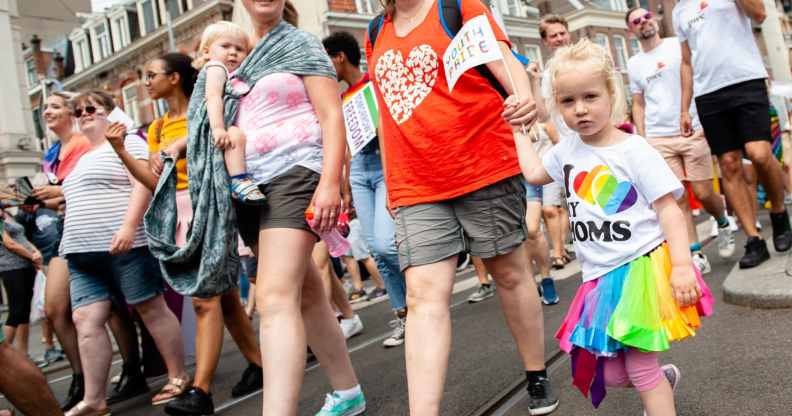Dutch lawmakers set to ban religious schools from refusing LGBT+ students and families for no other reason other than hate

People take part during the Pride Walk, in Amsterdam, Netherlands. (Romy Arroyo Fernandez/NurPhoto via Getty Images)
Several parties in the Netherlands have launched a multi-pronged attempt to ban schools from refusing students based on theirs or their parents’ sexual orientation.
A bill filed by the Labour Party, as well as a similar motion by the Socialist Party, hopes to tweak an article in the Dutch constitution that has been abused by homophobic educators.
The NL Times reported that the bill has already netted support across a cross-party majority in Tweede Kamer, the lower house of the Dutch parliament, including from the ruling centre-right People’s Party for Freedom and Democracy and the Democrats 66.
The 87-strong group of lawmakers are vying to “put an end to the door policy that special schools can implement”, Socialist Party member Jasper van Dijk told the broadcaster Nederlandse Omroep Stichting.
“It is too crazy for words that a school can refuse a child because they are not Christian,” van Dijk said. “I’d prefer to see all children go to school together.”
A school should be able to refuse children from LGBT+ families, says education minister.
It comes just a week after education minister Arie Slob winnowed fury from lawmakers and LGBT+ activists for defending Christian schools that force parents and guardians to sign anti-queer statements, such as ones rejecting that homosexuality exists, before admitting their child.
In an effort to sow support in the Christian blocs of the country’s coalition government, Slob, a member of the Christian Union party, looked to Article 23 as the main backbone of argument.
The article of the 1917 constitution states that state and privately-run schools are equal and educators are free to organise teaching based on a specific set of beliefs, such as a religion.
This enables privately run religious schools to refuse to admit pupils whose families do not subscribe to the belief or ideology which the teaching is based.
Both coalition parties, the Christian Democratic Appeal party and the ChristenUnie, are opposed to amending Article 23.
Yet, critics jostled to stress to Slob that Article 23 clashes with Article One – the prohibition of discrimination – and the various equality laws that constellate it. Only earlier this year did the Tweede Kamer emphatically vote to add “sexual orientation” as a protected characteristic.
“As a school, you cannot have the task of creating a safe environment for students and at the same time require a statement from parents rejecting homosexuality,” Socialist Party parliamentarian Peter Kwint said.
“That makes it less safe for students both at school and at home.”

